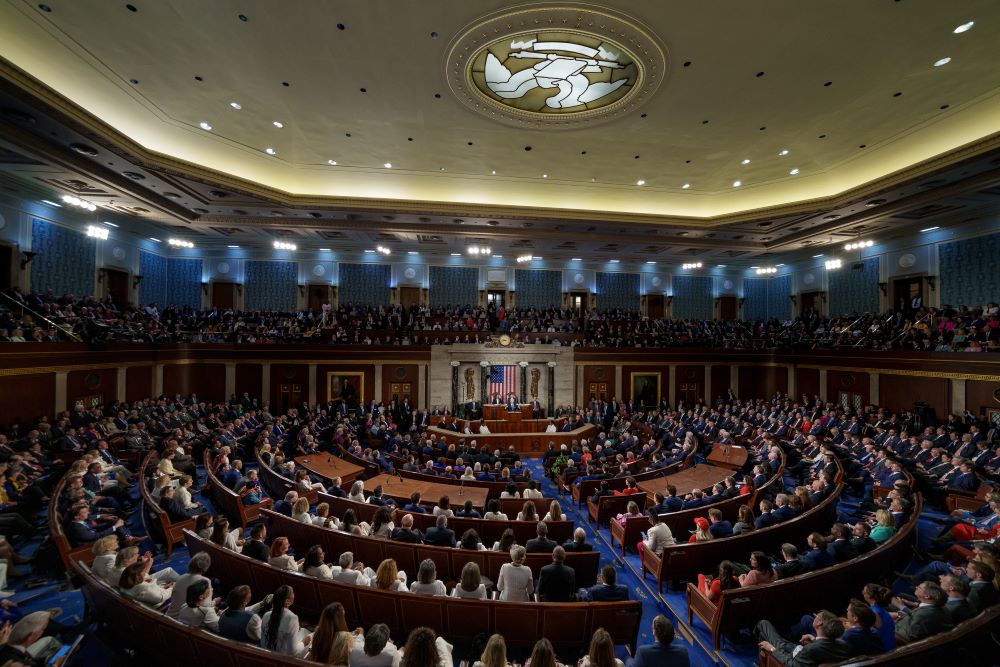
President Joe Biden delivers his State of the Union address to a joint session of Congress in the House Chamber at the U.S. Capitol, March 7 in Washington, D.C. (Official White House photo/Oliver Contreras)
With President Joe Biden at the helm of a national security apparatus trying to keep tensions in the Mideast from boiling over, and former president Donald Trump focused on his trial in the hush money case, now is a good time to start looking at the down-ballot races that will likely affect the nation one way or the other in significant, if not equally, profound ways.
The GOP majority in the House of Representatives is razor thin and by week's end, when Wisconsin Rep. Mike Galagher's resignation takes effect, Speaker Mike Johnson will have exactly one vote to spare. In a parliamentary system, with strong parties, a narrow margin helps enforce party loyalty. In today's GOP caucus, with the likes of Rep. Marjorie Taylor Greene threatening to bring down the speaker if he moves forward on bipartisan legislation, the ensuing chaos has led to a mounting number of GOP members of Congress declining to run for reelection. That means even more contests will be in play come November than usual.
The New York Times recently looked at some races that are expected to be close and might determine control of the House chamber. They rightly note that more Republican incumbents, 17, represent districts that Biden won in 2020 than Democratic incumbents, 5, who represent districts Trump won.
As pollster Nate Cohn explained to The New Yorker's Isaac Chotiner after the 2022 midterms, two issues, democracy and abortion, helped keep Democratic losses down that year. If abortion was on the ballot in a state, such as Michigan, it boosted Democratic turnout. I have written previously about the uneven political effects of abortion and why Democrats should be careful not to overplay their hand on the issue.
Swing states, however, were all stronger than expected for the Democrats in part because swing voters turned against radical MAGA candidates. "Democracy is clearly something concentrated in battleground states in which Stop the Steal candidates would have had the power to subvert national elections," Cohn observed.
Looking at the results in New York, Cohn added:
The Republicans not only benefitted from the absence of democracy or abortion as issues, they succeeded at refocussing the electorate on something else, due to effective statewide campaigns that drew voters' attention to crime or education or whatever. But that was only possible because this ultra-high-stakes set of issues, such as the future of democracy, wasn't at play. I don't believe that anyone seriously believed, for instance, that Lee Zeldin was going to overturn the 2024 Presidential result in New York.
Cohn also pointed to data surveyed by the Albany Times Union which showed that GOP turnout in 2022 was at presidential, not midterm, election levels, while Democratic turnout lagged. Four of the House seats Democrats lost in 2022 were in New York. How was that possible?
Jim Brennan at the Gotham Gazette noted some bone-headed mistakes the Democrats made in 2022 in the Empire State. For example, after enacting a tax cut, Gov. Kathy Hochul sent the checks to voters in June, rather than in October, a violation of Politics 101.
Advertisement
Democrats also had been moving hard to the left in recent years. In 2018, the highest-ranking New Yorker in the House, Rep. Joe Crowley, was knocked off in a primary upset by Rep. Alexandria Ocasio-Cortez. In 2020, longtime Rep. Eliot Engel was beaten in a primary by Jamaal Bowman, who went on to easily win election in November. Both members of "the Squad" won re-election in their heavily Democratic districts in 2022, but both Ocasio-Cortez and Bowman are being challenged now in the Democratic primaries.
The Democrats control the legislature in Albany but they did not use their power to toss out a redistricting map put forward by a bipartisan commission, a map that only tinkered with the district lines. GOP Rep. Mike Lawler, who narrowly defeated incumbent Democrat Rep. Sean Maloney in 2022, joked about the maps ruining the chances of his expected Democratic opponent on X, formerly Twitter: "There goes Mondaire Jones's campaign for Congress."
These congressional districts in the suburbs and exurbs of New York City are also likely to support GOP candidates who have not wavered on their support for Israel. As I discussed in analyzing the media coverage of the Michigan primary, GOP attack ads on the subject of Israel's war for Gaza will likely start with video of celebrations in the West Bank and Gaza on 9/11. That will be devastating in the New York suburbs.
Looking back at the 2022 results, it seems the leaders of New York's Democratic Party have some explaining to do. Elections are won by candidates and by issues but they are also won by old-fashioned organizing. When four of the House seats Democrats lost in 2022 came from a state like New York, you have to suspect that the party stopped doing the grunt work of knocking on doors, making sure people are registered, driving them to the polls if needed, and all the other things a party needs to do to make sure its voters turn out.
The Cook Political Report states that there are 11 toss-up races in which the Democrat is the incumbent and 11 in which the Republican is. It doesn't get much closer than that!
The consequences of these contests are only marginally less important than the presidential race. If Joe Biden wins reelection, a GOP-controlled House could make it impossible for him to enact meaningful legislation. If Trump wins, a GOP-controlled House would be a rubber stamp. These House races matter. And, at this point, it looks like control of the lower chamber couldn't be more up for grabs if it was a basketball.








